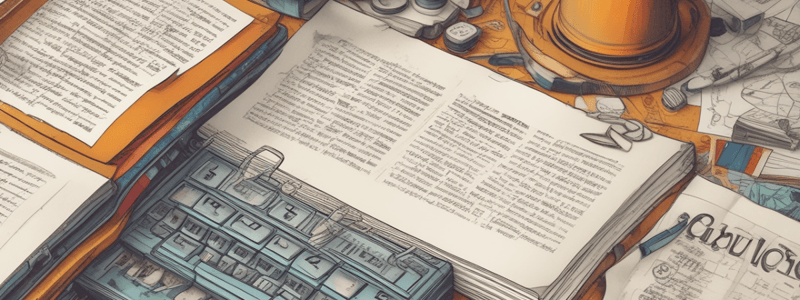Podcast
Questions and Answers
What types of articles are 'a' and 'an'?
What types of articles are 'a' and 'an'?
- Indefinite articles (correct)
- Definite articles
- Noun articles
- Adjective articles
Which conjunction type is used to connect independent and dependent clauses?
Which conjunction type is used to connect independent and dependent clauses?
- Correlative conjunctions
- Coordinating conjunctions
- Subordinating conjunctions (correct)
- Conclusive conjunctions
What type of words are 'both/and', 'either/or', and 'neither/nor'?
What type of words are 'both/and', 'either/or', and 'neither/nor'?
- Conjunctions (correct)
- Prepositions
- Homophones
- Interjections
What is the purpose of interjections in a sentence?
What is the purpose of interjections in a sentence?
What is the primary function of homophones?
What is the primary function of homophones?
'An hour' is an example of using the article 'an' before a word starting with a:
'An hour' is an example of using the article 'an' before a word starting with a:
What is the purpose of adverbs in writing?
What is the purpose of adverbs in writing?
Which of the following questions can adverbs answer?
Which of the following questions can adverbs answer?
What are relative adverbs primarily used for?
What are relative adverbs primarily used for?
Which type of nouns do articles not typically accompany?
Which type of nouns do articles not typically accompany?
In what situations can articles be stressed in speech?
In what situations can articles be stressed in speech?
What type of article refers to a specific or particular thing?
What type of article refers to a specific or particular thing?
What are antonyms?
What are antonyms?
What is the purpose of using synonyms in writing?
What is the purpose of using synonyms in writing?
What is the main part of a word that gives it meaning?
What is the main part of a word that gives it meaning?
Which of the following is NOT a type of context clue?
Which of the following is NOT a type of context clue?
What is the purpose of prefixes in changing a word's meaning?
What is the purpose of prefixes in changing a word's meaning?
What is the suffix '-ment' used for?
What is the suffix '-ment' used for?
What do context clues help readers do?
What do context clues help readers do?
'Hear' is a verb that means:
'Hear' is a verb that means:
Flashcards are hidden until you start studying
Study Notes
Adverbs
- Adverbs modify verbs, adjectives, or adverbs
- Adverbs answer questions like "When?", "Where?", "In what manner?", and "To what extent?"
- Adverbs add precision and interest to writing
Relative Adverbs
- There are three relative adverbs: "why", "where", and "when"
- Relative adverbs link sentences and/or clauses together and provide additional information about the subject of a sentence
- These adverbs tell you more about the time, location, and reasons for something occurring
Articles
- Articles are a type of determiner that gives more information about the noun or pronoun
- Articles help to give structural information, especially in a sentence
- The absence of both definite and indefinite articles is called zero articles
- Articles are never stressed in general speech, but they can be stressed when one wants to distinguish them from other words
- Articles are not applicable with non-countable nouns (e.g., milk, water, air, joy, happiness, pride, and love)
- There are two types of articles: Definite and Indefinite
- Definite article: "the" (refers to a specific thing or person)
- Indefinite article: "a" and "an" (used before nouns in their singular form)
Conjunctions
- Conjunctions are words that join two or more words, phrases, or clauses
- There are three types of conjunctions: Coordinating, Correlative, and Subordinating
- Coordinating conjunctions: one-word connectors that sit between the two words, clauses, or phrases they're connecting (e.g., and, but, or, nor, for, so, yet)
- Correlative conjunctions: words that join forces with other words to make connections (e.g., both/and, either/or, neither/nor, not only/but also)
- Subordinating conjunctions: used when one clause is independent and one clause is dependent (e.g., since, after, although, as, because, before, once, that, though, while, unless)
Prepositions
- Prepositions show relationships in sentences
- Prepositional phrases link the preposition and the object of the preposition to the subject of the sentence
- Prepositional phrases usually answer where or when questions
Interjections
- Interjections are one of the eight parts of speech
- Interjections convey emotion
- Interjections can be classified by their purpose into three categories: volitive, emotive, cognitive, and sometimes onomatopoeia
- Interjections can further be classified by whether they are primary or secondary in nature
- Interjections are punctuated by an exclamation point or a comma depending on the strength of emotion demonstrated
- Interjections should be used sparingly and with a specific purpose in order to be most effective
Homophones
- Homophones are words that sound the same but have different meanings
- Homophones can have the same or different spelling
- The reader may need to use context clues to find out what makes sense
- Examples of homophones: "here" and "hear"
Synonyms
- Synonyms are words that mean the exact same or almost the same thing as another word
- Synonyms can help your writing be more descriptive and colorful
- Synonyms can be interchangeable with other words, but they shouldn't change the context
- You can find synonyms using a thesaurus
Antonyms
- Antonyms are words that have opposite meanings of another word
- Antonyms are generally adjectives, prepositions, and verbs
- Nouns (like colors) rarely have antonyms
- Keep in mind that, while some words may be very different, that doesn't mean they're the opposite of each other
Analogies
- Analogies make a parallel comparison based on a similar characteristic or feature
- A simple analogy contains two pairs of words with similar relationships
- In literature, there are often more complex analogies that compare parallel concepts to create vivid descriptions
Root Words, Prefixes, and Suffixes
- A root word is the most basic form of a word
- Root words can have prefixes (attachments at the beginning) and suffixes (attachments at the end)
- A knowledge of root words, prefixes, and suffixes can be helpful to determine the meanings of unfamiliar words
- Prefixes are pairs or groups of letters that come before a base word, changing its meaning
- Examples of prefixes: "en-" (means "in" or "within"), "-ed", "-ing", "-ly", "-est"
- Suffixes are word parts that are added to the end of a root word to change the meaning
- Examples of suffixes: "-ment" (means the act of doing something or the result of an action)
Context Clues
- Context clues are a skill that readers use to figure out the meaning of unknown words
- Context clues can come in the form of examples, definitions, or synonyms
- By looking at the words or sentences that come before and after the word in question, we can use clues to unlock the meaning
Written and Spoken Language
- Written language is considered more formal and should follow the rules of the English language
- Spoken language is generally less formal, and the rules are less important
Studying That Suits You
Use AI to generate personalized quizzes and flashcards to suit your learning preferences.




